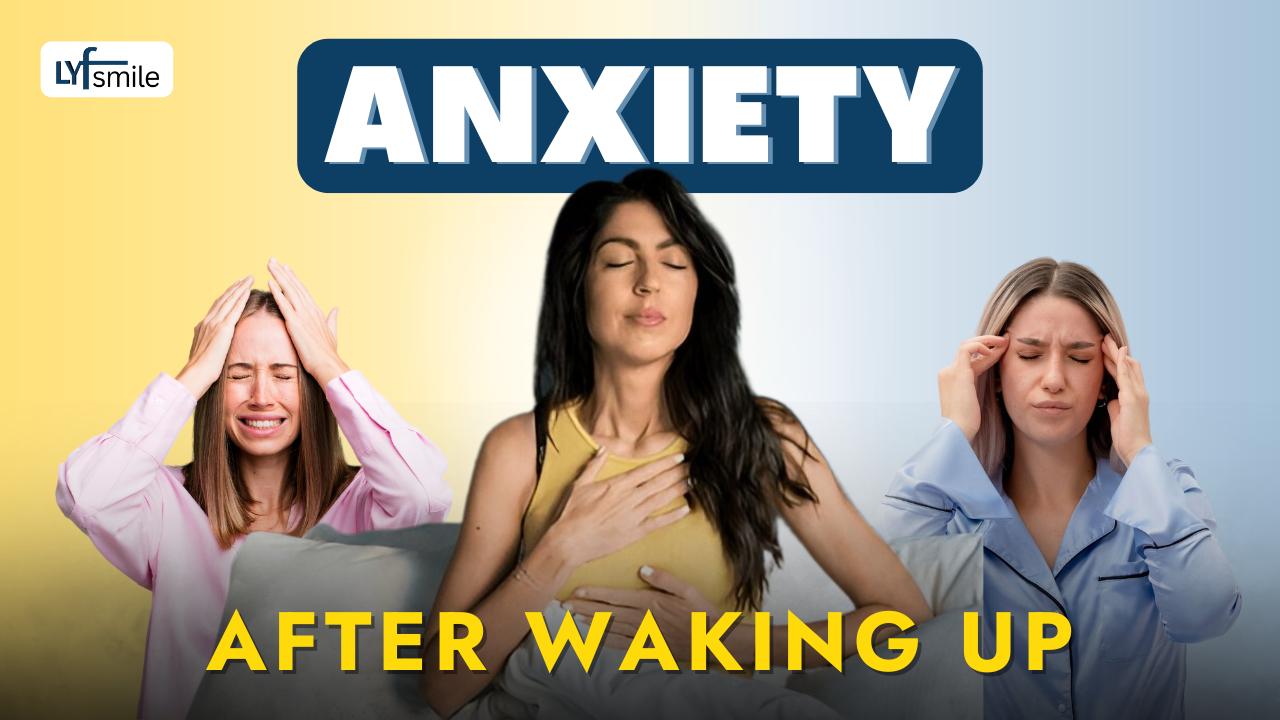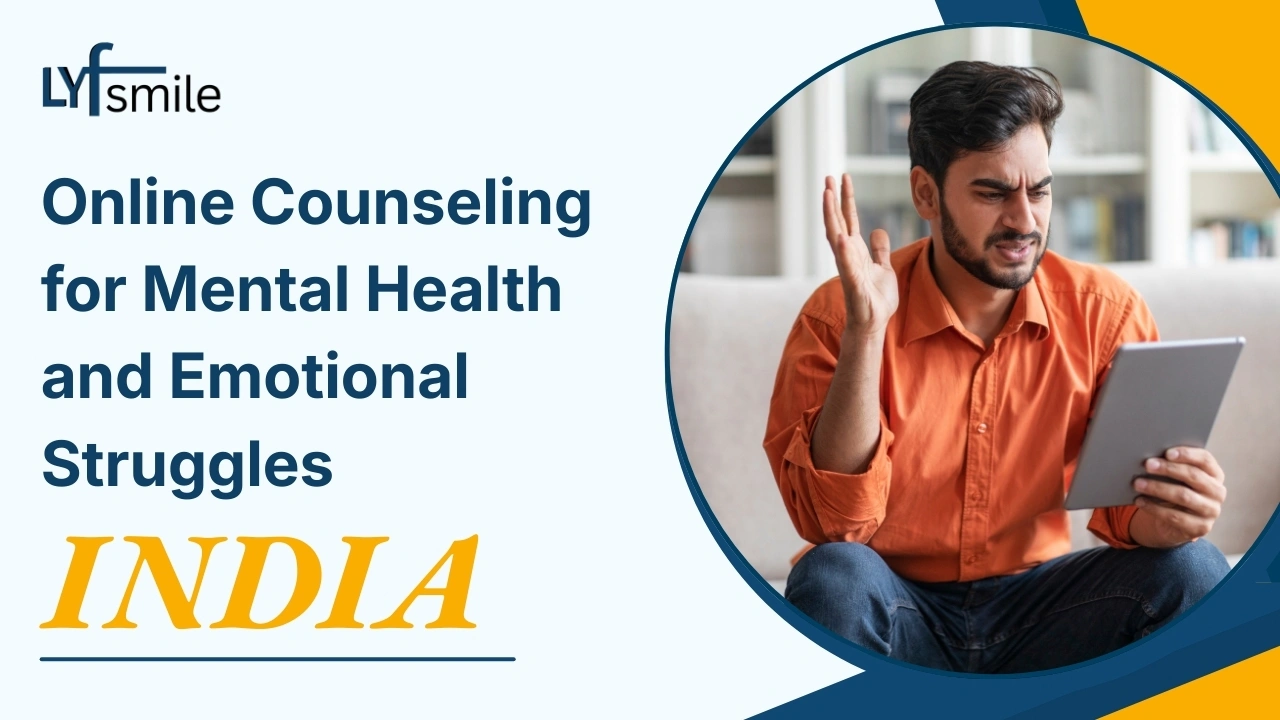
Anupam Tripathi
Anxiety After Waking Up: Why It Happens and How to Calm It
Anxiety after waking up is more common than most people realize. Waking up should feel peaceful—a new day, a new start. But for many people, mornings begin with tightness in the chest, racing thoughts, and an unshakable sense of fear. This is called morning anxiety—when anxiety greets you before your alarm even stops ringing.
If you often wonder, “Why do I wake up anxious?”, you’re not alone. Let’s explore what morning anxiety really means, why it happens, how it feels in real life, and the most effective ways to calm it—including where to find anxiety help in Gurgaon if you need professional support.
What Is Morning Anxiety and How It Feels
Morning anxiety is that overwhelming feeling of nervousness, worry, or sadness that hits right after waking up. It’s not just being “grumpy in the morning.” It’s a deeper emotional and physical reaction—as if your brain wakes up before your body is ready to face the day.
Common Experiences People Describe:
Anxiety after waking up looks like feeling your heart race the moment you open your eyes.
An urge to cry or stay in bed (crying after waking up from anxiety)
A flood of negative thoughts after waking up
Replaying past mistakes or regrets from yesterday (thinking about the past)
Dreading upcoming responsibilities or social situations
A heavy, sad feeling that lingers (morning sadness or morning depression)
For many, mornings feel like panic without a reason—sometimes leading to morning panic attacks, where your body shakes or your breath quickens even before you’ve had coffee.
Why Do I Wake Up Anxious? (The Science and Triggers)

Waking up anxious isn’t random—it’s a mix of biological, psychological, and lifestyle factors. Here’s what’s really happening behind the scenes:
1. Cortisol Spike in the Morning
Your body releases cortisol, the “stress hormone,” early in the day to help you wake up.
But for people prone to anxiety, this spike feels more like panic—causing a racing heart and uneasy thoughts.
2. Poor Sleep or Nighttime Overthinking
If your sleep is restless, your brain doesn’t fully recharge. Waking up after hours of worry leaves your mind still in “alert” mode. Anxiety after waking up may make you feel very anxious, so it must be kept away from your mind.
3. Thinking About the Past or Future
Morning often gives your mind quiet time—and that silence can amplify negative thoughts after waking up. You might replay regrets, conversations, or worst-case scenarios from the day before.
4. High-Stress Lifestyle
Work pressure, relationship issues, or constant screen time late at night can make mornings harder. You wake up already feeling behind.
5. Underlying Mental Health Conditions
Morning depression, generalized anxiety disorder, or panic disorder can make morning anxiety worse. If you regularly feel drained or tearful, professional anxiety counseling in Gurgaon or mental health therapy in Gurgaon can help.
7 Easy Ways to Calm Anxiety After Waking Up

Waking up with anxiety can feel like starting the day on the wrong foot—your heart races, thoughts spin, and it’s hard to feel grounded. But a few small morning changes can help you feel calmer and more in control. Here are 7 easy ways to reduce anxiety after waking up naturally:
1. Take Slow, Deep Breaths
Before you even get out of bed, take a few deep breaths. Inhale slowly through your nose, hold for a few seconds, and exhale gently.
Why it helps: Deep breathing signals your brain that you’re safe, reducing cortisol (the stress hormone) that spikes in the morning.
2. Avoid Checking Your Phone First Thing
Scrolling through messages, emails, or social media right after waking up can overwhelm your brain.
Try this instead: Take 10–15 minutes to stretch, drink water, or just sit quietly before facing digital noise.
3. Write Down Your Thoughts or To-Do List
Sometimes anxiety after waking up happens because your mind feels cluttered with tasks and worries.
Solution: Keep a journal beside your bed—write what’s stressing you or what you need to do today. Getting it out on paper helps your brain relax.
4. Move Your Body Gently
You don’t need a full workout—even light stretching or a short morning walk releases endorphins, your body’s natural stress relievers.
Bonus: Moving helps you shake off that heavy, anxious feeling and boosts energy levels for the day.
5. Practice Mindfulness or Meditation
Spend 5–10 minutes focusing on your breath, sounds, or sensations around you. Apps or calming music can help if you’re new to it.
Why it works: Mindfulness brings your attention to the present moment instead of spiraling into “what-ifs.”
6. Eat a Balanced Breakfast
Skipping breakfast or eating too much sugar can make anxiety worse.
Try oatmeal, fruits, eggs, or yogurt—foods that keep your blood sugar stable and your mind calm.
7. Create a Calming Morning Routine
Set a routine that feels peaceful—maybe listening to soft music, opening curtains for sunlight, or lighting a candle.
Recognizing the Symptoms of Morning Anxiety
Anxiety doesn’t just live in your thoughts—it shows up in your body, emotions, and behavior too. Recognizing these early signs can help you manage them faster.
Cognitive Symptoms (Mind)
Constant worry the moment you wake up
Difficulty focusing or planning the day
Negative thoughts after waking up
Overthinking or replaying past situations
Physical Symptoms (Body)
Racing heartbeat or chest tightness
Nausea, dizziness, or upset stomach
Shortness of breath or trembling
Restlessness—unable to relax or sit still
Emotional Symptoms (Feelings)
Feeling tearful (crying after waking up with anxiety)
Irritability or frustration
Hopelessness (morning sadness / morning depression)
Sudden panic attacks after waking
Behavioral Symptoms (Actions)
Avoiding getting out of bed
Procrastinating on daily tasks
Seeking reassurance from others
Excessive scrolling or isolating yourself
How to Calm Anxiety After Waking Up

Anxiety after waking up can be reduced. Here comes the hopeful part—you can absolutely manage morning anxiety with practical steps, self-care, and sometimes professional help.
1. Ground Yourself the Moment You Wake Up
Before checking your phone, take 3 deep breaths.
Focus on the feeling of the sheets, the sounds around you, and your breath. This grounds your mind in the present.
2. Avoid the “Caffeine + Chaos” Combo
Caffeine first thing in the morning can heighten anxiety. Start with water, light stretching, or herbal tea before coffee.
3. Journal Your Thoughts
Write down your first thoughts every morning—no matter how negative they seem. This helps you unload thinking about the past and start the day with mental clarity.
4. Move Your Body
A short walk or yoga can reduce cortisol and release calming endorphins. Even 10 minutes helps!
5. Listen to Calming Music or Affirmations
Replace negative thoughts after waking up with gentle affirmations like
“I am safe right now.”
“My thoughts don’t define me.”
“This feeling will pass.”
6. Talk It Out
Sometimes morning anxiety needs more than self-help.
If your symptoms are regular or severe, consider therapy for morning sadness or anxiety counseling in Gurgaon. A trained therapist can help you understand triggers, reframe thoughts, and build coping routines that work for you.
How Morning Routines Affect Anxiety Levels
The way you start your morning can either calm your mind or intensify your anxiety. A structured, soothing morning routine helps your brain feel safe and focused—instead of rushed and reactive.
Try These Routine Adjustments:
Wake up gently—use a calm alarm sound instead of a loud ringtone.
Avoid social media for at least 30 minutes; don’t invite comparison first thing in the morning.
Plan your day the night before so mornings feels predictable, not chaotic.
Practice gratitude journaling—note 3 things you’re thankful for; this rewires your brain toward positivity.
Step into sunlight—natural light boosts serotonin, balancing your mood.
Even small changes in your morning habits can gradually lower morning sadness, reduce negative thoughts after waking up, and prevent those uneasy morning panic attacks.
When to Seek Professional Help

If your morning anxiety feels constant or starts affecting your work, sleep, or relationships, it’s time to reach out for professional help.
Sometimes, self-care alone isn’t enough—and that’s okay. Therapy offers a safe space to process your fears and learn effective coping tools.
Consider Getting Help If You Notice:
Anxiety lasts most mornings for weeks or months.
You feel tearful or hopeless (crying after waking up with anxiety).
Panic attacks or restlessness make daily life difficult.
You’re avoiding tasks or people because of morning fear.
You experience morning depression symptoms like low energy or loss of interest.
In such cases, connecting with anxiety help in Gurgaon, anxiety counseling in Gurgaon, or mental health therapy in Gurgaon can make a life-changing difference. Professional therapists use evidence-based methods like CBT, mindfulness therapy, and relaxation training to bring lasting peace.
Finding the Right Emotional Support and Therapy in Gurgaon

While lifestyle changes make a huge difference, persistent morning anxiety often needs expert guidance. Fortunately, Gurgaon has some excellent options for therapy and counseling.
1. Anxiety Counseling in Gurgaon
Therapists here specialize in identifying the root causes of anxiety—from stress patterns to trauma—and use techniques like CBT (Cognitive Behavioral Therapy) and mindfulness to help you regain balance.
2. Mental Health Therapy in Gurgaon
Licensed psychologists and counselors provide sessions both online and offline. Whether you’re dealing with morning depression, panic, or general anxiety, therapy helps you process emotions and rebuild calm.
3. Therapy for Morning Sadness and Emotional Regulation
If you often wake up crying or feel low, therapy helps you learn emotional regulation and gentle morning routines that soothe rather than shock your system.
4. Supportive Community and Long-Term Care
Anxiety after waking up is not a big deal if you get mental support on time. Many therapy centers in Gurgaon offer group sessions, meditation workshops, and self-care plans that keep you supported throughout recovery.
Conclusion: You Deserve Peaceful Mornings
Anxiety after waking up has become a common issue amongst our new generation. Morning anxiety might feel like a daily battle, but it’s not permanent. By understanding its triggers, listening to your body, and getting the right help—especially with anxiety counseling in Gurgaon or mental health therapy in Gurgaon—you can start every day with steadiness instead of fear.
You only have to notice the symptoms or trauma you are struggling with every morning; after that, just connect with mental health therapy in Gurgaon, which surely feels you and assists you.
FAQs
1️ Why do I wake up thinking about the past?
Your brain is most active in the early morning, and that’s when unresolved emotions resurface. Thinking about the past right after waking up is often your mind’s way of processing unfinished worries or regrets. Journaling or morning mindfulness can help you release these thoughts.
2️ How to stop waking up anxious?
Try building a calm morning routine—avoid checking your phone, take deep breaths, and stretch before starting your day. If anxiety hits often, therapy can help you understand your triggers and reframe anxious thoughts.
3️ How to calm morning anxiety naturally?
Natural remedies like mindful breathing, a short walk in sunlight, gentle affirmations, and avoiding caffeine early can reduce morning anxiety. Consistent habits teach your body to start the day calmly.
4️ Why do I feel guilty when I wake up?
Morning guilt often stems from overthinking, unprocessed emotions, or perfectionist tendencies. Recognizing these feelings without judgment and talking them through in therapy can help you release unnecessary self-blame.
5️ Why does my heart race when I wake up with anxiety?
A racing heart is caused by a cortisol surge—your body’s natural “wake-up” hormone. In anxious people, this spike feels more like panic. Deep breathing or grounding exercises can quickly calm your system.
6️ Why is anxiety worse in the morning?
Morning anxiety worsens because cortisol levels are highest after waking. Combine that with low blood sugar, fatigue, or lingering stress, and your body reacts strongly. A balanced breakfast, hydration, and slow mornings help.
7️ How to stop overthinking in the morning?
Write your thoughts down the moment you wake up—it gets them out of your head and onto paper. Meditation or short gratitude journaling also shifts your focus from what’s wrong to what’s working.
8️ Why do I cry in the morning even when I’m not sad?
Crying upon waking doesn’t always mean sadness—it can be your body’s release of emotional buildup or anxiety. It’s a sign your nervous system is overwhelmed and needs care, rest, and support.
9️ Is crying in the morning a sign of anxiety or depression?
Yes, it can be. When your emotions feel heavy the moment you wake up, it may point to anxiety, morning depression, or burnout. If this happens frequently, professional counseling can help you heal the root cause.
10. What is Anxiety After Waking Up?
"Anxiety After Waking Up" refers to that sudden feeling of nervousness, unease, or panic you experience soon after opening your eyes. It’s often linked to high morning cortisol levels and mental stress carried over from the previous day.








